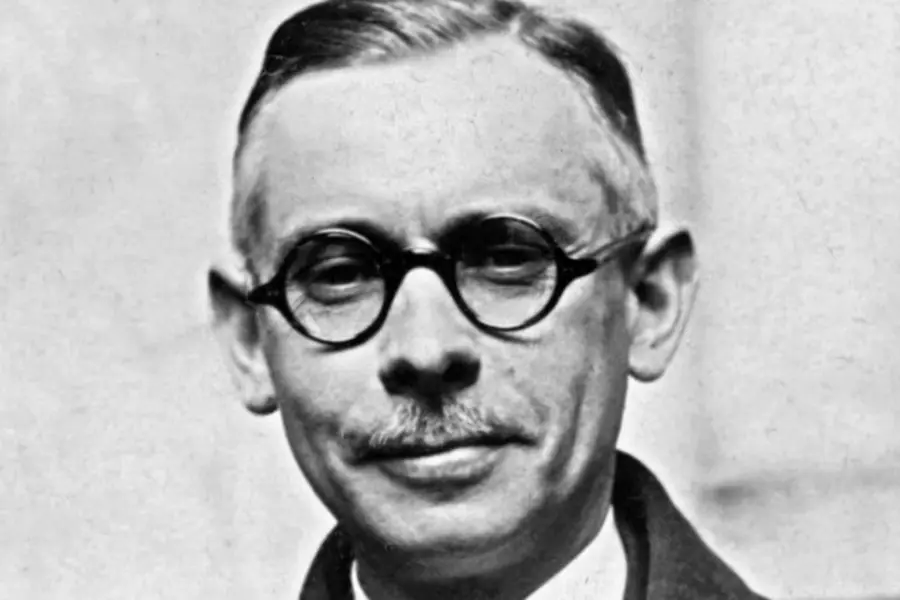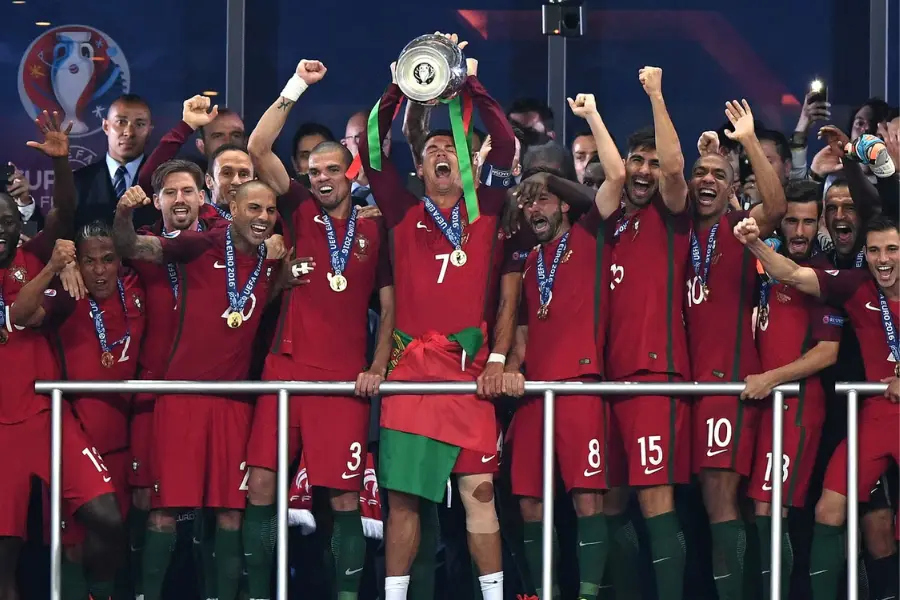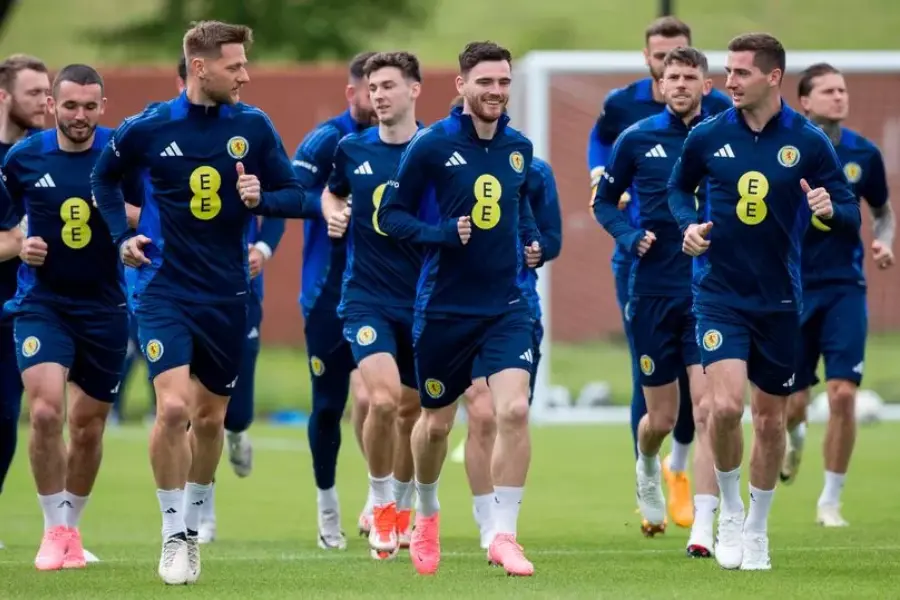The European Championships 2024
The European Championships (Euros) are set to get underway in Germany with the top national football teams in Europe set to battle it out for the chance to write their name in the history books. The Scottish National Football team will be in action for their second consecutive tournament with their campaign kicking off against the hosts in the first match of the tournament on Friday 14th June 2024.
The History of the Euros
How Did The Euros Start?
The UEFA European Championship, commonly called the Euros, is the primary association football competition contested by the senior men's national teams of the Union of European Football Associations (UEFA). The idea for the tournament was initially proposed by Henri Delaunay, the secretary of the French Football Federation, as early as 1927. However, it wasn't until 1958, three years after Delaunay's death, that the inaugural tournament was organised, with his son Pierre Delaunay playing a pivotal role in its establishment. Delaunay initially, lacked significant support, which only materialised around 1960. Until 1980, only four teams progressed to the final stages; however, now 24 teams compete, establishing it as one of the largest football tournaments annually, second only to the World Cup.
The Euros were first held in 1960 in France
Pierre was appointed secretary of the European Nation's Cup organising committee that same year and the competition's trophy was designated the Henri Delaunay Cup in honour of his father's pioneering work. The team that wanted to compete in the inaugural edition had to pay only 200 Swiss Francs at the time.
Formation and Qualifying Process
The tournament initially featured a knockout format, with a small number of teams participating. Over the years, the format evolved to include group stages and an increased number of teams, reflecting the growth pupillarity and competitive nature of the sport in Europe. The qualification process has also expanded, initially involving a smaller number of teams, and now encompassing a wide array of nations vying for a sport in the tournament.
Tournament History and Winners
European Championships - France 1960

The USSR team and delegation in France in 1960, AFP.
The first European Nations Cup, as it was initially known, took place in 1960 in France. The tournament started with a qualifying phase, involving 17 teams. Notably, Spain withdrew from the competition due to political reasons, despite progressing to the quarterfinals. The final tournament featured four teams, with the Soviet Union defeating Yugoslavia 2-1 in the final, held at the Parc des Princes in Paris. The Soviet Union’s team was captained by Igor Netto, and their manager was Gavriil Kachalin. Viktor Ponedelnik scored the decisive goal in extra time, becoming the top scorer of the inaugural event.
European Championships - Spain 1964
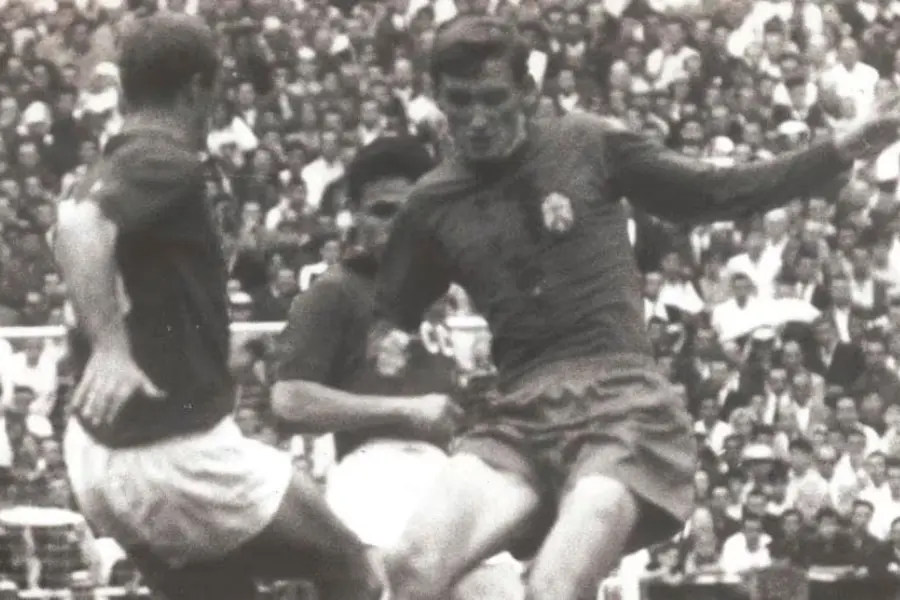
Action from the finals of the 1964 EURO.
Spain hosted the second European Nations Cup finals, with the Santiago Bernabeu stadium being the venue for Spain's semi-final against Hungary and their final triumph over the reigning champions, the Soviet Union, with a score of 2-1, clinching their first major title. Jesús Pereda gave the Spaniards an early lead with a goal at the six-minute mark, the quickest in EURO history at the time. Marcelino Martínez scored the decisive winning goal. Fernando Olivella, a central defender born and raised in Catalonia, led Spain as a captain to their first-ever international triumph, which he celebrated the day before his 28th birthday The top goal scorer of this edition was Dezső Novák from Hungary.
European Championships - Italy 1968
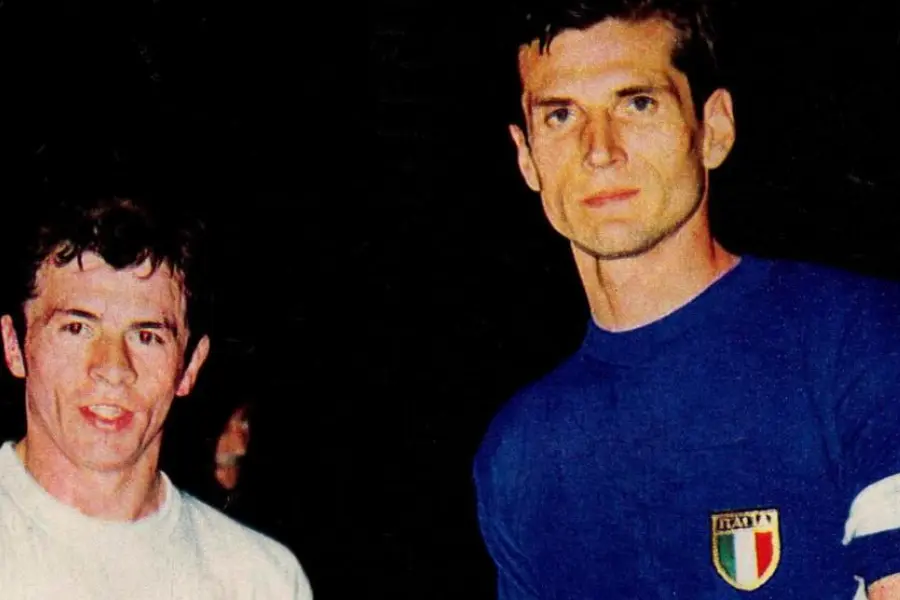
Yugoslavia's IIija Petkovic and Italy's Giacinto Facchetti ahead of the UEFA EURO 1968 final Alamy Stcock Photo.
Italy hosted the 1968 edition, which introduced a group stage in the qualification process. The hosts were behind Yugoslavia at Rome's Stadio Olimpico due to Dragan Džajić's goal just past the 39-minute mark and seemed on course for a loss. However, Angelo Domenghini equalized with ten minutes remaining, making it 1-1 and necessitating a replay two days later. The Hosts won the tournament on home soil, defeating Yugoslavia 2-0 in the final. The winning was managed by Ferruccio Valcareggi and captained by Giacinto Facchetti, who saw Luigi Riva and Pietro Anastasi scoring in the final. Dragan Džajić of Yugoslavia was the top scorer of the tournament.
European Championships - Belgium 1972
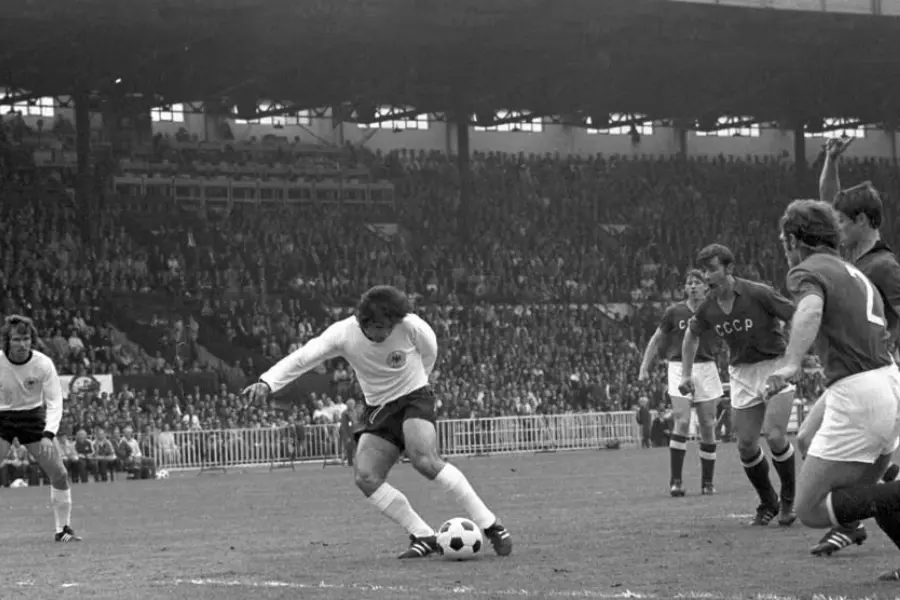
West Germany's Gerd Muller shoots in the 1972 EURO final dpa Picture-Alliance/AFP
The 1972 tournament, held in Belgium, witnessed West Germany's first triumph. The hosts eliminated the World Cup champions Italy in the quarter-finals, and the signs were promising as the host nation had won the trophy in the two preceding European Championships. However, in Antwerp, Van Himst's team couldn't turn the fairy tale into reality. West Germany won 2-1, thanks to a brace from the legendary Gerd Mueller, and merited an even larger victory margin. Then, West Germany went on to defeat the Soviet Union 3-0 in Brussels, with Gerd Müller scoring twice to become the top scorer with four goals. Helmut Schön managed the team, and Franz Beckenbauer served as the captain.
European Championships - Yugoslavia 1976
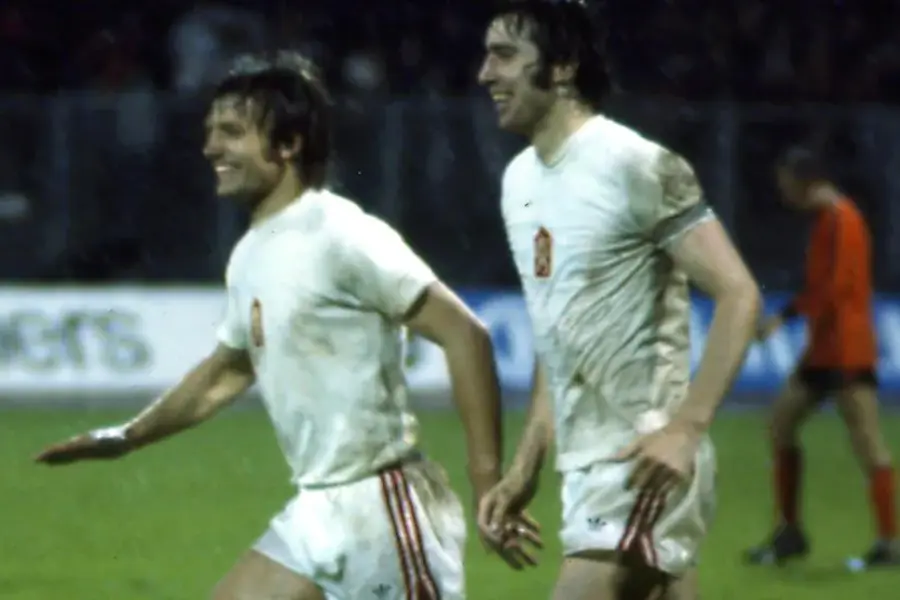
Ladislav Jurkemik and Anton Ondrus celebrate Czechoslovakia's UEFA 1976 victory over the Netherlands Icon Sport via Getty Images.
The 1976 event occurred in two venues, Yugoslavia and Czechoslovakia hosted and won their only European Championship, beating West Germany in a penalty shootout in Belgrade after a 2-2 draw initially. Uli Hoeness's missed penalty in the shoot-out provided Panenka with the opportunity to decide the match, and the Bohemians Praha midfielder seized the moment, fooling goalkeeper Sepp Maier with a lengthy run-up before softly lofting the ball into the net. "I chose the penalty because I realised that it was the easiest and simplest way of scoring a goal," Bohemians Praha said. Václav Ježek who led the champions to their very first title victory and Anton Ondruš as captain. Dieter Müller of West Germany was the top scorer with four goals.
This tournament saw the rise of the Paneka penalty following the penalty-shoot out in the final.
European Championships - Italy 1980
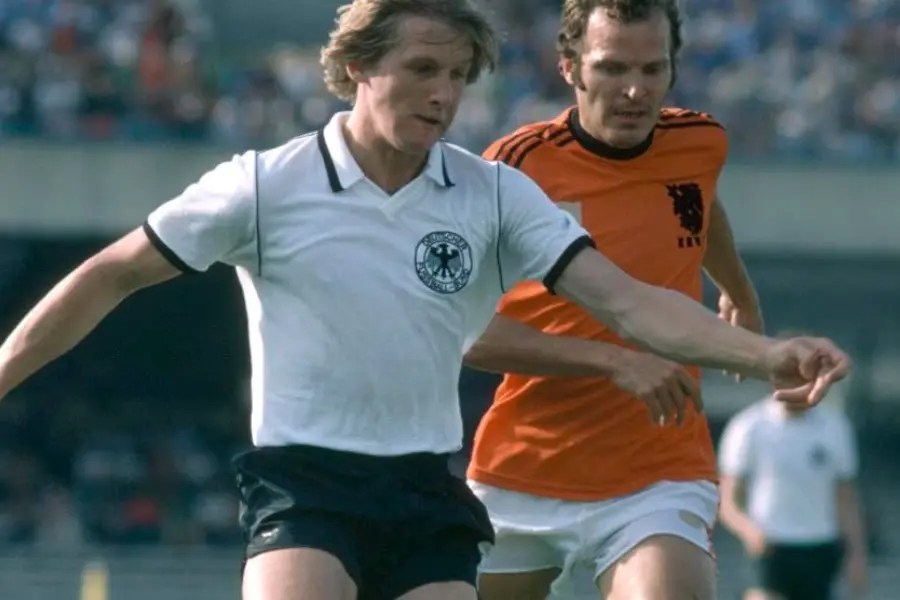
Netherlands Willy van de Kerkhof tracks West Germany's Bernd Schuster at UEFA EURO 1980 Popperfoto via Getty Images.
The 1980 tournament in Italy marked the expansion to eight teams rather than four. The triumph of the 1976 UEFA European Championship intensified the demand for more spots in the 1980 final tournament, prompting UEFA to increase the number of teams to eight as the event returned to Italy. The expanded line-up saw the teams split into two groups, with the group winners proceeding to the final and the second-placed teams vying for third place. Additionally, as part of the new format, Italy, as the host nation, was granted automatic entry into the finals. West Germany won their second title by defeating Belgium 2-1, at Rome's Stadio Olimpico, with Horst Hrubesch scoring both goals in the final. Jupp Derwall led the team to become champions and the captain was Bernard Dietz. Klaus Allofs was the top scorer of the tournament with three goals.
European Championships - France 1984
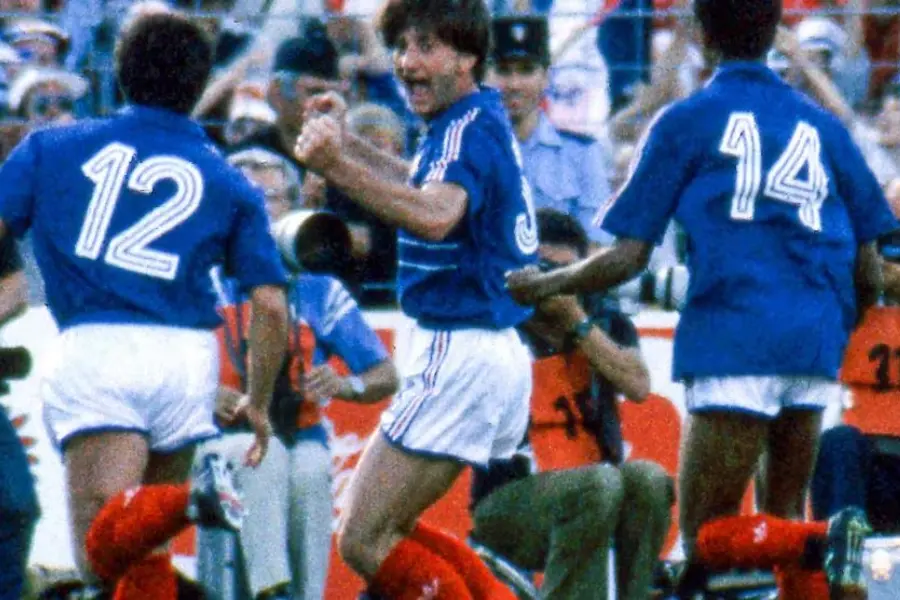
Jean-Francois Domergue celebrates scoring in the UEFA EURO 1984 semi-final against Portugal Icon Sport via Getty Images.
France hosted and won the 1984 edition of the Euros, their first major international trophy, in which Michel Hidalgo was a head coach and captained by Didier Six. France remains the sole host nation to have won the expanded UEFA European Championship, having defeated Spain 2-0 in the final at Paris's Parc des Princes. Yvon Le Roux of France was sent off towards the end of the match, yet it was the host team that found the net once more, with Bruno Bellone leaving his imprint on the game. "It was the first official trophy won by France in a team sport, so it was a great moment for French football and for French sport as a whole," Platini said. The 1984 tournament was the emergence of Michel Platini scoring an impressive nine goals, including a hat-trick against Belgium, and was the top scorer, a record for a single tournament.
European Championships - West Germany 1988
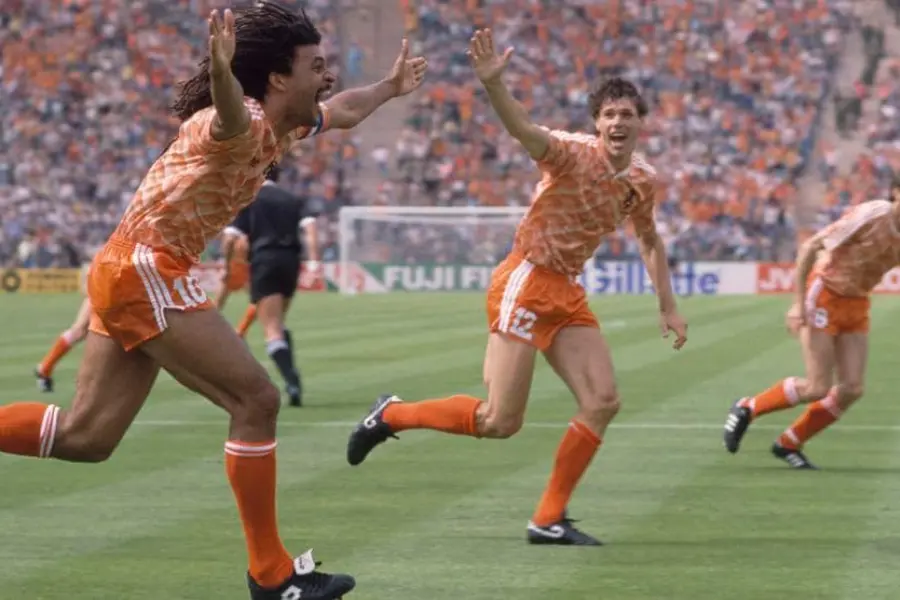
Captained by Ruud Gullit, Netherlands won their first major trophy at EURO 1988, Popperfoto via Getty Images
The 1988 tournament in West Germany saw the Netherlands claim their first major title, beating the Soviet Union 2-0 in the UEFA European Championships final, which was staged at Munich's Olympiastadion. Ruud Gullit gave the Oranje the lead in the first half, and Marco van Basten's spectacular volley from a sharp angle sealed the match after 52 minutes. He said, "You need a lot of luck with a shot like that." Ruud Gullit became the first captain to hoist a significant international trophy when, at the age of 25, he raised the Henri Delaunay Trophy following the final in Munich),
Rinus Michels guided the Netherlands to EURO triumph during his third tenure as the national team's coach, and is known as the architect of 'Total Football,'. Ruud Gullit finished as the top scorer, and Van Basten’s volley in the final is considered one of the greatest goals in the European Championship History.
European Championships - Sweden 1992
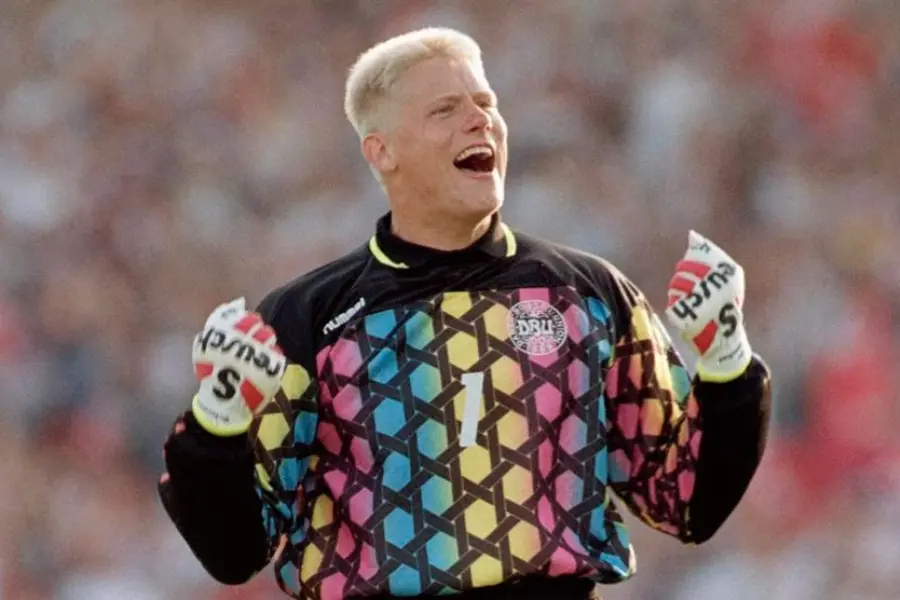
Peter Schmeichel celebrates Denmark's UEFA EURO 1992 triumph, Getty Images.
Sweden hosted the 1992 European Championships, where Denmark famously triumphed despite initially failing to qualify, only participating after Yugoslavia was disqualified due to the Balkan conflict. The Danes narrowly advanced through the group stage, defeated the defending champions, the Netherlands, in the semi-finals via penalties, and were under pressure for the majority of the final at Ullevi Stadium in Gothenburg.
Managed by Richard Møller Nielsen and captained by Lars Olsen, Denmark defeated reigning champions the Netherlands in the semi-finals and beat Germany 2-0 in the final, a great effort from both, John Jensen and Kim Vilfort. Henrik Larsen and Dennis Bergkamp were the top scorers. "It really sank in when we were in Copenhagen in the town hall for the celebrations with the rest of Denmark. At this point you're thinking: Christ, we actually did this, it's not a dream". Goalkeeper Peter Schmeichel remembered.
European Championships - England 1996
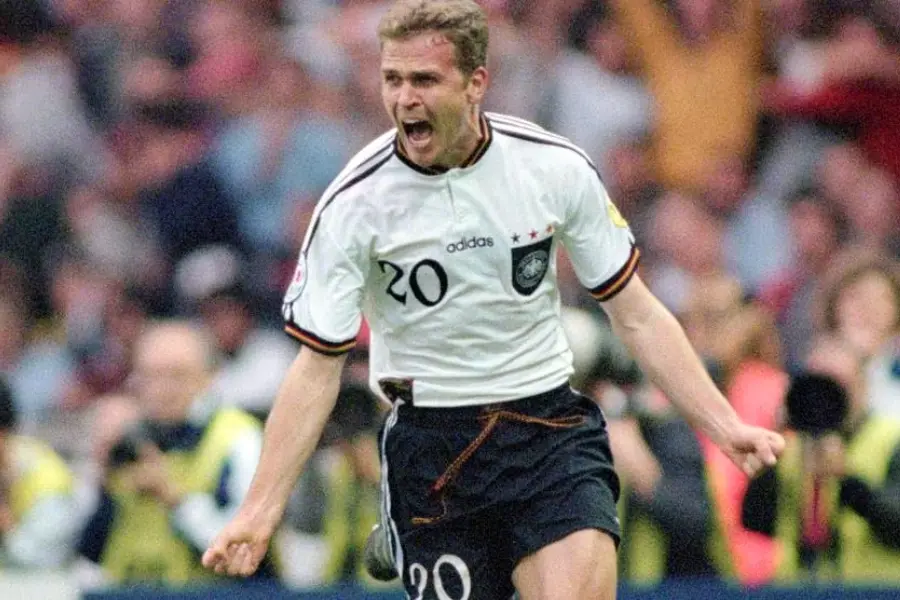
Oliver Bierhoff scores the Golden Goal in the final to win UEFA EURO 1996, Hulton Archive.
England hosted the 1996 tournament, the country's very first UEFA Championships, and which introduced the golden goal rule. Games took place in eight different cities include Birmingham, Leeds, Liverpool, London, Manchester, Newcastle, Nottingham, and Sheffield.
Germany won their first title following the reassembling, and their third trophy by defeating the Czech Republic 2-1, in the final in extra time, thanks to Oliver Bierhoff's golden goal, at Wembley. Berti Vogts led the Germans to success in this tournament, and Jürgen Klinsmann was the captain. He led by example, scoring three goals and participating in the final despite a calf strain that had side-lined him for the semi-finals. Alan Shearer of England was the top scorer with five goals.
European Championships - Belgium and the Netherlands 2000
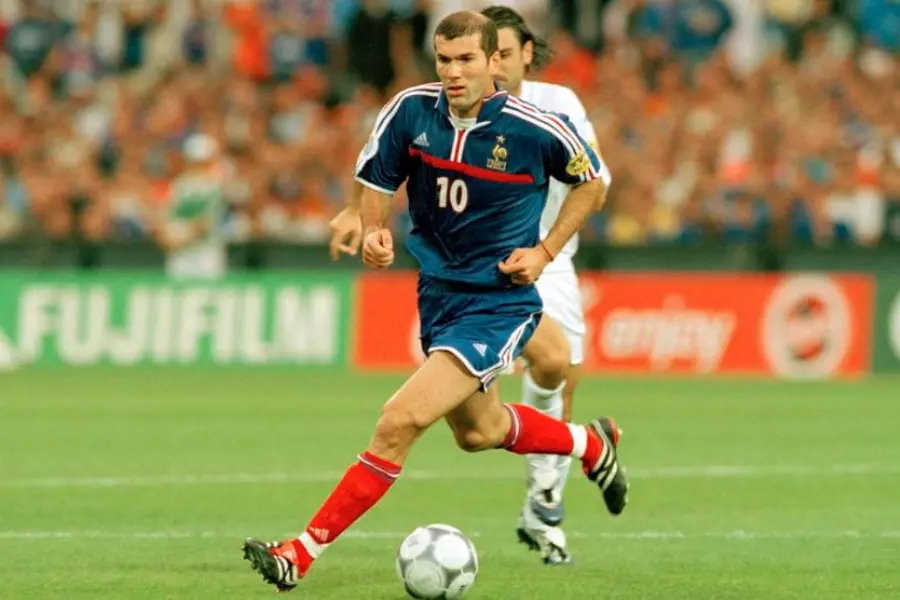
Zinedine Zidane was EURO 2000's Player of the Tournament, Popperfoto via Getty Images
The Euro 2000 event was co-hosted by Belgium and the Netherlands, where each country provided four venues, marking the first time multiple countries hosted the event. France claimed their second title by beating Italy 2-1, 13 minutes into the extra time, with David Trezeguet scoring the golden goal. He remembered, "I hit the ball as it dropped. It went in and we became the first team to win the European Championship after winning the World Cup. It was a great thing for our country."
After serving as Aimé Jacquet's assistant during France's 1998 World Cup victory, Roger Lemerre assumed full leadership and became the first Les Bleus manager to win a major tournament abroad (France having won EURO '84 and the world title as hosts).
The winner of the 2018 World Cup in Russia, who also led his nation to the consecutive World Cup final in Qatar 2022, was none other than Didier Deschamps, the captain of France during the 2000 European Championship. The tournament was notable for its high level of competition and dramatic matches, resulting in Patrick Kluivert and Savo Milošević being joint top scorers
European Championships - Portugal 2004
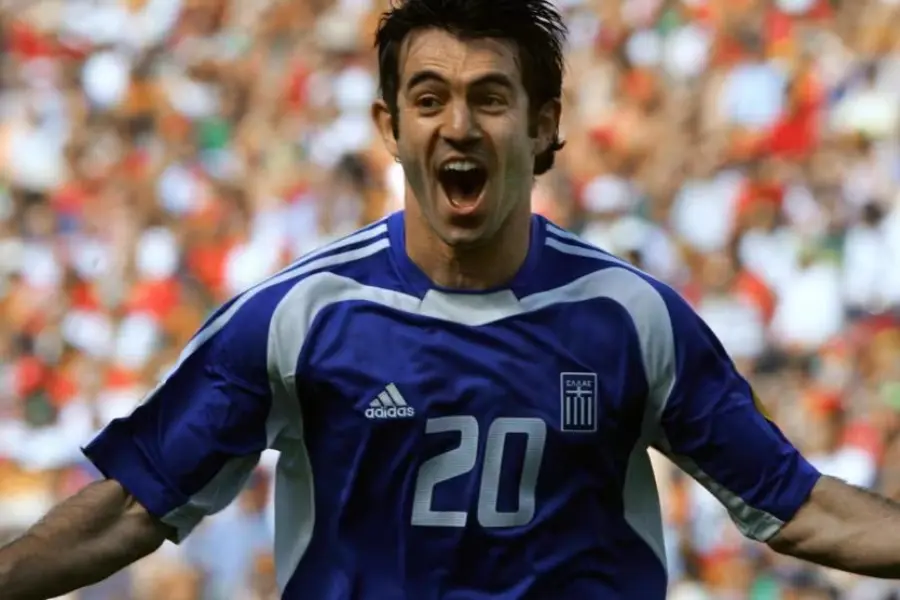
Giorgos Karagounis scores in Greece's opening-game victory over Portugal at EURO 2004, AFP via Getty Images
In 2004, Portugal was the host of the tournament that witnessed Greece's stunning triumph, as they defeated Portugal 1-0 in the final. This victory is often regarded as one of the greatest upsets in the history of football. Greece, seen as the underdogs, clinched the tournament with a team celebrated for their disciplined defense-oriented gameplay. Under the management of Otto Rehhagel and the captaincy of Theodoros Zagorakis, Greece rose to the occasion. Zagorakis remembered "When the referee ended the match, it was as if the lights went out - another blank spot in my memory - the constant smile of an idiot on my face for I don't know how many minutes. Unbelievable moments." Meanwhile, Milan Baroš from the Czech Republic emerged as the top scorer, netting five goals.
European Championships - Austria and Switzerland 2008
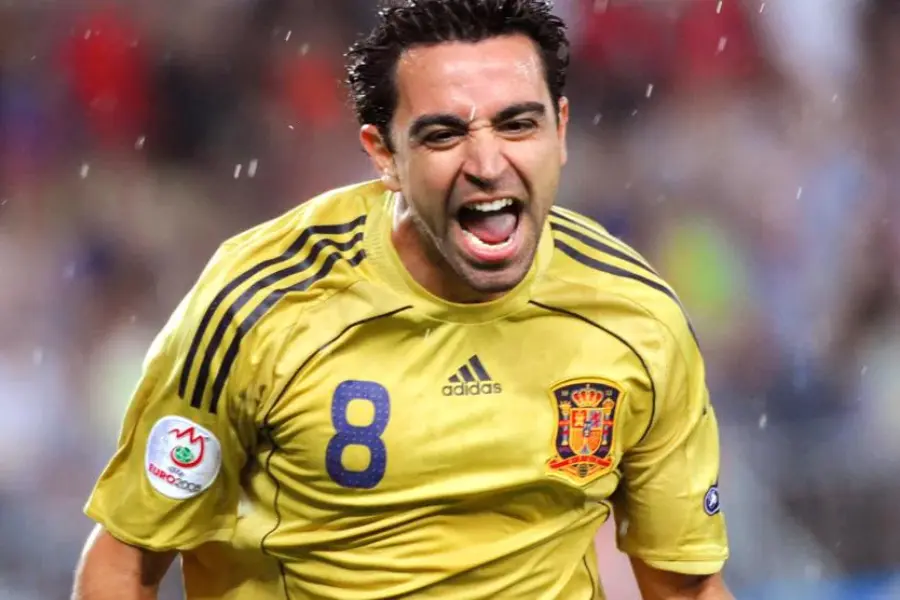
Xavi Hernandez steers in the opening semi-final goal against Russia UEFA EURO 2008, AFP via Getty Images.
Austria and Switzerland co-hosted the 2008 European Championships and the final was staged in Vienna with Spain being crowned champions, following their win over Germany. The final finished 1-0 with the only goal coming from Fernando Torres in the 33rd minute (after La Roja registered seven shots on target, in contrast only one), and won their second European Championship. Spain, managed by Luis Aragonés and captained by Iker Casillas, began their era of dominance in world football. David Villa was the top scorer with four goals, despite missing out on the final match due to an injury. The tournament where marked by their fluid and attacking style of play.
European Championships - Poland and Ukraine 2012
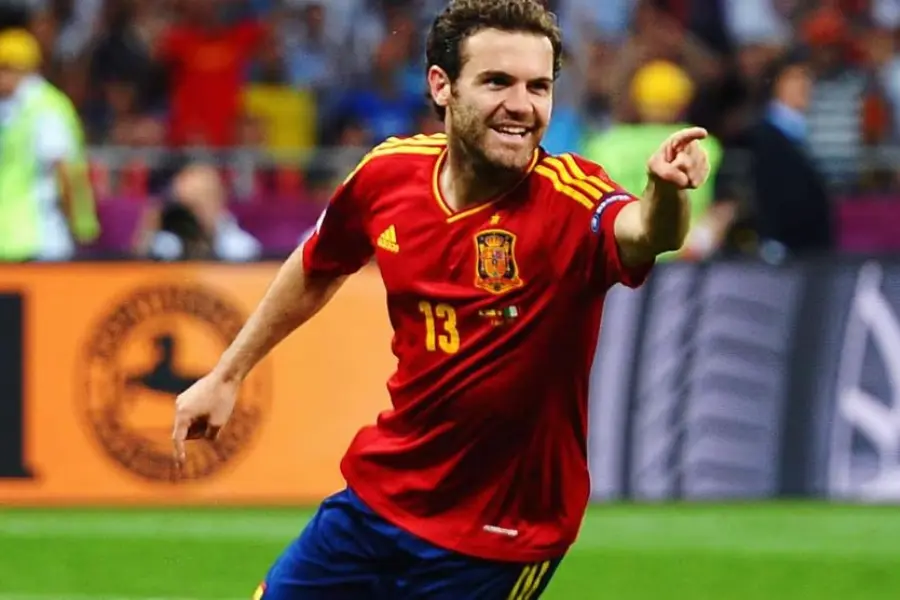
Juan Mata celebrates scoring Spain's fourth goal in the EURO 2012 final win against Italy, Getty Images.
Both Poland and Ukraine hosted the 2012 European Championship final, games featured in four cities each, respectively. Spain triumphed over Italy with a 4-0 victory in the final, at the Olympiyskiy Stadium in Kyiv, marking the most decisive win in an EURO final and completing an unparalleled series of major tournament victories. La Roja, defended the title, becoming the first team to win two consecutive European Championships and three major international tournaments in a row (Euro 2008, World Cup 2010, and Euro 2012).
Vicente del Bosque guided Spain to victory in the EURO 2012 campaign, and in the process, became the first coach to achieve the distinguished trio of UEFA Champions League, World Cup, and European Championship titles. Iker Casillas, who had also worn the armband in the previous EUOS, won his 100th game for Spain and became the first player to captain a team to two EURO victories.
Torres received the Golden Boot award as he, similar to Mario Gomez, was credited with an assist. However, Torres took 93 fewer minutes (189 minutes of playing time) compared to the German's 282 minutes to accumulate his goals. Moreover, he emerged as the first player to score in two EURO finals, having also scored in 2008, and the third player to clinch the EURO top scorer title after Denmark's Henrik Larsen in 1992 and his fellow Spanish teammate David Villa in 2008
European Championships - France 2016
France hosted the 2016 tournament, which featured 24 teams for the first time, expanding from the previous 16-team format. Portugal won their first major international title by defeating France 1-0 in the final after extra time. Eder scored the winning goal, with Fernando Santos as manager and Cristiano Ronaldo as captain who played a pivotal role despite being injured during the final. Antoine Griezmann was the top scorer with six goals.
European Championships - Pan-European 2020
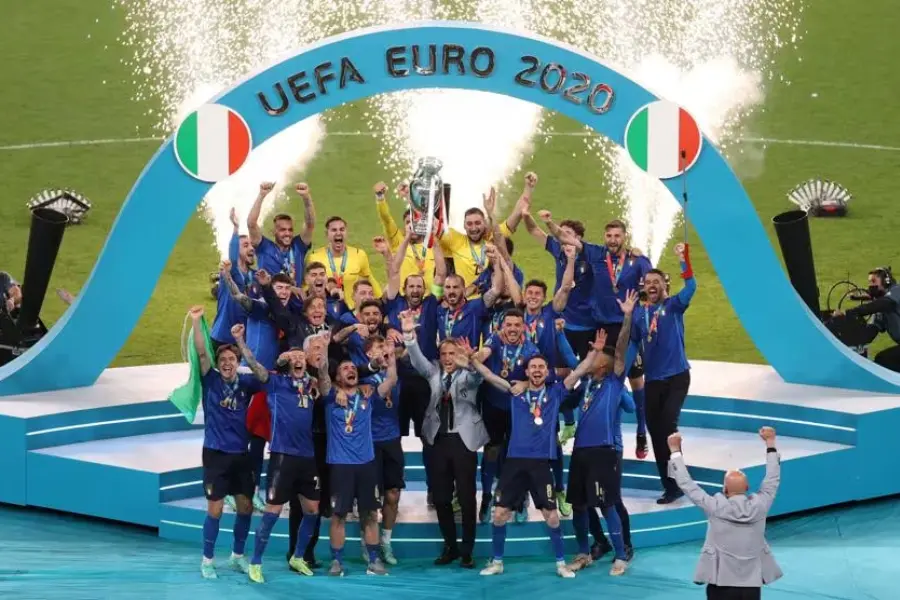
Giorgio Chiellini lefts the trophy after the EURO 2020 final, POOL/AFP via Getty Image
The 2020 tournament was postponed to 2021 due to the Covid–19 Pandemic. This event was unique as it was hosted across multiple cities in Europe to celebrate the 60th anniversary of the competition. Italy won their second European Championship, defeating England 3-2 on penalties after a 1-1 draw. Roberto Mancini managed Italy, with Giorgio Chiellini as captain. Cristiano Ronaldo and Patrik Schick were joint top scorers. The tournament was noted for its thrilling matches and the resurgence of Italian football.
European Championships - Germany 2024
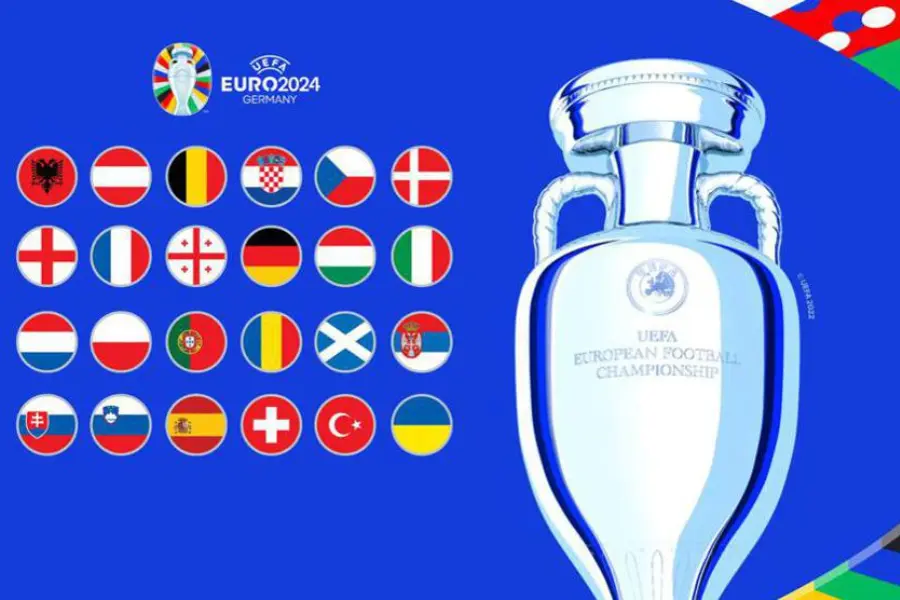
The UEFA EURO 2024 contenders, UEFA
Germany is set to host the 2024 European Championships, promising to deliver a spectacular event with matches across ten cities. The tournament will continue to feature 24 teams, maintaining the expanded format introduced in 2016. The anticipation is high as teams prepare to compete for the prestigious title and add another chapter to the rich history of the Euros.
Scottish Participation in the Tournament
Scotland has had a sporadic history in the European Championships. They qualified for the tournament for the first time in 1992, held in Sweden, and again in 1996 in England. Their participation has been limited, but the Scottish national team continues to strive for success in European competitions. Scotland qualified for this event, marking their return after participating in the Euro 2020 tournament.
Scotland have reached back-to-back European Championships finals for the first time since 1998, under Steve Clarke, the first Scotland manager to accomplish this. The next goal for Clarke and the team is to create more history by being the first Scotland team to get past the group stage in a finals competition if they can produce their final qualifying form.
Five Interesting Facts about the Euros
- The tournament has seen multiple format changes, expanding from a four-team final tournament in 1960 to the current 24-team format.
- Spain and Germany are the most successful teams, each winning three titles.
- The Euros have been won by ten different national teams, showcasing the competitive nature of European football.
- The 1960 final had the lowest attendance for a final match, with only 17,966 spectators.
- Michel Platini holds the record for the most goals in a single tournament, scoring nine in 1984.
Oriam's Partnership with SFA (Scottish Football Association)
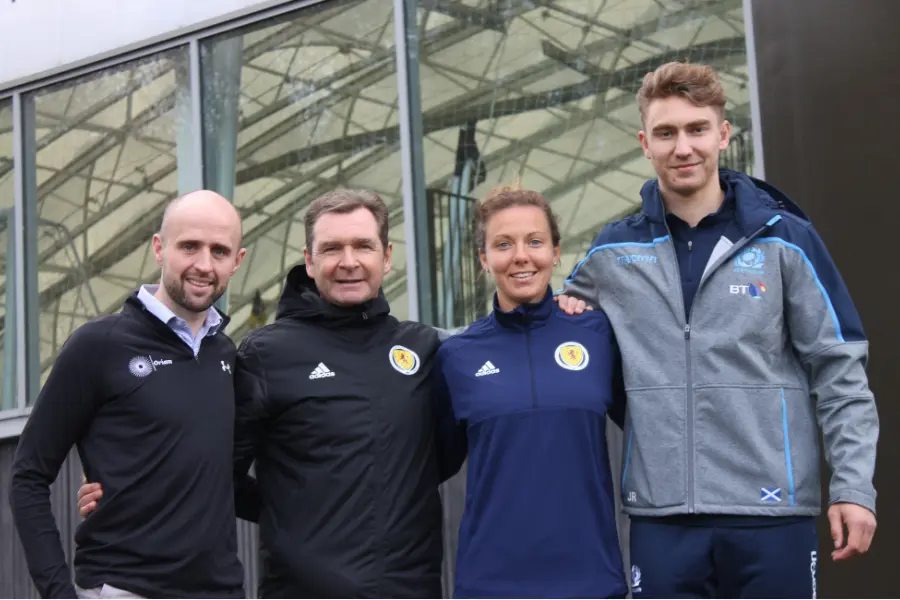
Ross Campbell, Executive Director at Oriam, with Scottish Football Association Representatives.
The Scottish Football Association (SFA) has partnered with Oriam, Scotland's Sports Performance Centre, to enhance football development and performance. Oriam hosted three of Scotland’s leading national teams on the same day for the first time in its history. These include men’s and women’s football squads, as well as Scotland's men’s rugby team. Oriam offers advanced facilities, including indoor and outdoor pitches, high-performance gyms, and medical facilities, aiming to elevate the standards of Scottish football by providing top-notch training, rehabilitation, and sports science services.
We are one of the few places in the country where members of the public can train and stay active under the same roof as professional athletes
Ross Campbell - Executive Director of Oriam Scotland's sports Performance Centre
“The arrival of three top sporting teams on the same day is a milestone for us and underlines the world-class facilities we have at our disposal. We are one of the few places in the country where members of the public can train and stay active under the same roof as professional athletes. Its model that is going from strength to strength and we look forward to welcoming future and current sports stars”.

